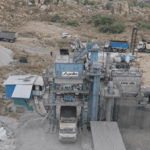Innovation has been the hallmark of Ambuja Cement, says Neeraj Akhoury, CEO India LafargeHolcim, MD & CEO, Ambuja Cements
The Pandemic has further expedited technological advancement such as minimum human intervention by integrating IoT, AI. Towards this, what are the R&Ds going on at your end?
Innovation has been the hallmark of Ambuja Cement since its inception. The company's strong credentials in research and development, and innovation have led to the development of new products and services to better serve the needs of its customers. Ambuja Cements has implemented Plants of Tomorrow programme – a LafargeHolcim’s global initiative which will help the company to utilize Automation Technologies and Robotics, Artificial Intelligence, Predictive Maintenance and Digital Twin Technologies for its entire production process. The implementation of digital tools has helped in asset optimization and ensuring higher plant availability. A “Plants of Tomorrow” certified operation shows 15 to 20 percent of operational efficiency gains compared to a conventional cement plant. Internet of Things (IoT) has been introduced across the manufacturing value chain and there is usage of artificial intelligence and machine learning under the project EDGE to facilitate rapid deployment of predictive models and seamless connectivity with plant data sources. Ambuja Cements have selected multiple initiatives on predictive quality (cement fineness, cement quality) and predictive maintenance (VRM failure, refractory life) to optimize energy consumption per tonne of cement, which will enable the company to save cost. Among the technologies implemented the company is conceptualizing Digital Eye to digitally monitor factory and plant operations (through drone and video analytics) to operate effectively and enhance safety.
How are you adapting to the ‘New Normal’?
At Ambuja Cement, Health and Safety is a core value. In the face of the coronavirus pandemic we have continued to live up to this core value, acting swiftly and with great solidarity to protect employees, contractors and all our stakeholders in the time of Coronavirus. We have a Business Resilience team which helped ease the new normal into the system for both, Ambuja Cements and ACC. We engage daily with key managers to ensure smooth business operations. While getting into the new normal our objective was to protect the health and wellbeing of our people, their families, and our stakeholders through medical preparedness, awareness, training and communication; maintain business activities through continuity planning and proactive supply chain management and to protect and strengthen long term relationships with our partners and the communities in which we operate.
We are encouraging employees to work from home. We are ensuring that there is no disruption of our services to our customers. Business travel has been prohibited across the country and Employees have been advised to restrict movement for personal reasons too. ZERO mobility has been ensured at plant colonies to restrict the virus spread and our medical capability to tackle Covid emergencies has been enhanced through procurement of additional oxygen concentrators. We are also supporting our people thorough a 24×7 Crisis Control Centre that has been set up for Covid related support to employees and their dependents. While our approach has been to deal with this pandemic very proactively, we are conscious of the need to alleviate the rising stress levels caused by the Covid challenge. We are therefore also focusing on a mental resilience programme for our employees and dependents that has a 24X7 helpline manned by trained psychologists.
The ongoing Pandemic has badly battered the economy. Does infrastructure hold the key to revive the Indian economy? Your views
The second wave of pandemic has undoubtedly created challenges for all sectors. However, the government is strongly inclined towards infrastructure growth especially through the National Infrastructure pipeline which has resulted in an increase in manufacturing in the September to March quarter which makes it pertinent to say that infrastructure has the key to revive the Indian economy. There has been a growing demand for construction, infrastructure & housing sectors which will revive the economy.
How do you see the economy, opportunities and challenges in this pandemic situation and please give us a brief idea about the strategies outlined to tap in the future potentials?
We have a roadmap to become the best in industry with strategic priorities structured under key levers of growth, competitiveness, innovation, digitalisation and sustainability. We are currently looking at significant debottlenecking opportunities across all plants with growth plans in mid-term to reach 50 million tonnes per annum capacity. At present, it has a cement capacity of 29.65 million tonnes with five integrated manufacturing plants and eight grinding units across the country. Our upcoming facility at Marwar Mundwa in Rajasthan will enhance clinker capacity by 3 MTPA and help improve cement sales by 5 MTPA, contributing to the long-term strategy of capacity expansion.
We would like to expand and grow in the right markets. We would like to bring in some very high performance concrete to this company. Our Sustainable Development Plan 2030 has a sharp focus on climate and energy, building a circular economy, conserving resources and nature, and driving meaningful change in the lives of communities. It aims to reduce CO2 to 463 kg CO2/ emission. We are targeting to reuse 13.5 million tonnes of waste and be 13 times water positive. It aims to save 77 litre per tonne of cementitious of water and positively impact the lives of 80 lakh beneficiaries through its various CSR programmes. We also have recently launched ECOPact with the same product with high performance that can reduce the CO2 emission to a very large extent. If we look at metropolitan cities the consumption of ready mix concrete is high. So all the apartments which are built and big projects, they all consume ready mix concrete. So we are quite well poised to take advantage of this.
What are your views on the need to adapt and remould the infra activities as per the New Normal to spur the economy?
There is certainly a rise in the digital landscape for businesses across all industries. The fact cannot be denied that the use of machine learning can be used to make supply chains more resilient. Leveraging data to drive operational agility has become the need of the hour. Within the upcoming few years, the companies will be bound to invest in digital tools to ensure optimization of resources & drive cost efficiencies. These digital opportunities will also ensure less human interaction & focusing on employees’ health. There is certainly a need to adapt the infrastructure activities as per new normal to ensure employee safety & maintain profitability in these turbulent economic conditions.
How can the government assist the cement sector in this Pandemic time?
As mentioned earlier the Government has taken steps to boost the infrastructure. In the budget the government had announced the plan to set up smart cities on the PPP model & 100 more airports by 2024. The government is ambitious with respect to development of more roads & highways. In the budget the government had single-handedly allotted 16.22 billion$ (1,18,101 crores) to the Ministry of Road, Transport & Highways. This initiative to bring everyone under affordable housing definitely provides a stimulus to this sector. Even the National infrastructure Pipeline has expanded to around 7400 projects. Other schemes such as the MGNREGA, PM Garib Kalyan Rozgar Abhiyan & schemes linked to individual state govt. have infrastructure projects thereby catering to the demand & boosting cement sector.
In this challenging Pandemic environment how are you providing succor to alleviate the sufferings of Covid-19 affected through your CSR activities?
Ambuja Cements has been committed to creating larger societal value. Being an inclusive and socially responsible organisation, community well-being is deeply ingrained in our culture. 2020 witnessed a global health crisis and in the fight against the pandemic, we sprang into action with Covid-19 relief interventions focused on the health and safety of communities. In the wake of the Covid-19 outbreak and subsequent nationwide lockdown, Ambuja Cement mobilised resources to protect the communities in which it operates. Through its CSR arm, Ambuja Cement Foundation (ACF), it ran relief efforts, awareness and food security programs for communities and the less privileged like migrant workers and daily wage labour, touching the lives of five lakh people. ACF assisted 525 SHGs apply for the Covid Sahay Loan to receive Rs. 4.26 crores as livelihood support. It also helped women make 4,52,000 face masks that were sold to health authorities, medical stores and even to Ambuja Cement.
Supporting the Government’s Covid-19 vaccination programme, Ambuja Cement foundation (ACF) also facilitated the vaccination of over 75,000 beneficiaries. As the country valiantly braces the second wave of the pandemic, Ambuja Cements along with ACC amplified their Covid-19 relief interventions. They have undertaken immediate actions for supply of oxygen by commissioning five oxygen generating plants – one in Ambujanagar, Gujarat, one in Nagaur, Rajasthan, and one in Amethi and two in Dadri, Uttar Pradesh. In addition to setting up the plants, the two companies are also providing 100 oxygen concentrators, each with a capacity of 10 litres per minute for Rajasthan and Gujarat, and similarly, 100 Oxygen-concentrators have been procured for Uttar Pradesh out of which 91 are already handed over to the State (46-DM Gautam Buddh Nagar & 45 DM-Amethi). ACC and Ambuja Cements, jointly have also supplied 200 concentrators to hospitals and COVID care centres in Delhi. Amidst these uncertain times, we will continue to support communities to emerge stronger to fight the pandemic.
Covid-19 protocol such as ‘minimum contact’ has further expedited Digital initiatives to be in contact with the manufacturing plants, dealers and suppliers. What are the digital initiatives you have taken in this regard?
The ongoing pandemic and subsequent lockdowns accelerated the adoption of digital technologies, like never before. We took a lead in digitizing the way we connect with our stakeholders and encouraged our business partners – retailers, contractors and masons – to adapt to the new normal. With lockdown, several construction sites were closed and with contractors at home, we wanted to continue our engagement with them. With this, the Technical Services team saw an opportunity to develop a platform to communicate with the stakeholders. Regular engagement was conducted on Covid appropriate behaviour, sustainable construction practices and this platform was leveraged to create awareness around Ambuja products. A loyalty programme called Abhimaan Loyalty was constituted with the vision to stay connected with the contractors. Built on the three strategic pillars of relationship, knowledge and skill building, and rewards, this programme facilitated engagement. We used this programme to encourage contractors to choose sustainable products, and help them imbibe sustainable construction practices. The platform saw an engagement of 13200+ contractors. Additionally, the team connected with 5343 contractors individually (one-to-one interaction call), and used this platform to guide customers on construction practices. This furthers our aim to adopt a holistic approach, which offers transactional and transformational value in our partnerships.
What are the sustainability initiatives you have taken to reduce CO2 emission during cement production at your plants?
The cement sector is resource- and energy-intensive. For us as a responsible business, sustainability is a way of life. We are consistently putting into action bolder plans for sustainable practices, and are working towards extending our environmental stewardship for resource conservation and energy efficiency. Our business strategies are aligned to the Sustainable Development Plan 2030, with a sharper focus on climate and energy, building a circular economy, conserving resources and nature, and driving meaningful change in the lives of communities. To deliver on the agenda of reducing our carbon emissions, we have adopted four key interventions: reduce clinker factor through incremental use of alternative materials like fly ash, slag, and waste gypsum; improve energy efficiency (thermal and electrical) and process technology; waste heat recovery and use of Renewable Energy (RE) and optimise fuel composition, along with the use of waste as alternative fuel. Under this plan, we aim to reduce CO2 to 463 kg CO2/t cem. The unique initiative, Waste Heat Recovery System (WHRS) will be deployed across six cities by 2022 that will reduce 5.61 lakhs tons of CO2 emissions per year.









